Moving into a new home can be a really daunting process. There's so much to remember and so much to do, that even with the help of friends and family it can seem like an impossible task.
That's why we've made the ultimate moving checklist so that you can move from A to B with minimal stress. This list covers everything from when to hire a moving company, how to save money, and even how to use your packing supplies properly!
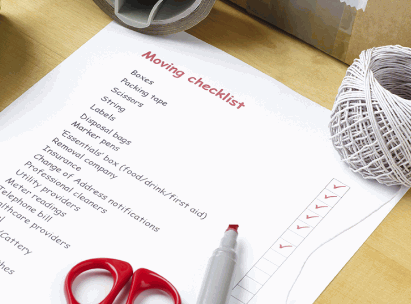
You should always make sure you are preparing to move as soon as you know you need to. This might be in the lead-up to a tenancy ending, or as soon as you get confirmation that a landlord or lender has accepted your application.
Typically, it is wise to start researching moving companies and preparing for your move about two months ahead of your move date. With that in mind, here are the administrative and preparatory tasks you need to make sure you get done in the lead-up to a move, broken down into weeks.
Find out more: How To Start House Moving
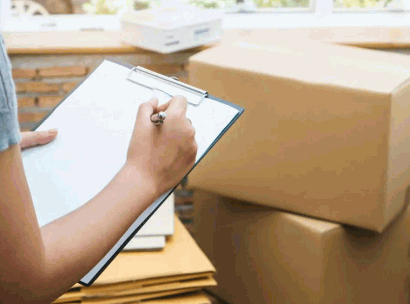
The very first task you need to tick off is giving notice to your landlord if you rent, or getting your house on the market if you are selling. Usually, for renters, the amount of notice you have to give as a minimum is listed in your contract. You will need to provide this in writing. If you're selling, contact a real estate agent to get your move kickstarted.
Once that's done, you should create a document or binder of some sort. This will help you to track everything throughout the moving process. It can be a physical binder or a Google Drive folder. The latter allows you to share your moving folder with your housemate or partner, providing you both the chance to organise things on your moving home checklist.
Your binder or folder should be the place where you save anything like final bills, quotes from moving companies, storage unit details, correspondence between you and the landlord (or real estate agent/buyer), receipts, and, perhaps most importantly, a spreadsheet with your moving budget.
It should also have a list of to-dos, such as:
You might also find it useful to attach deadlines to these items and to note down important dates like any viewings, inspections, and other appointments you might have during this process.
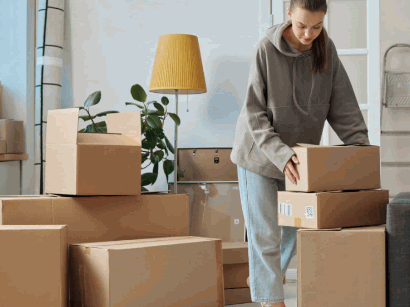
One of the most useful tips when it comes to moving house is developing a room-by-room inventory. This might seem like a mammoth task, but if you do it room-by-room across the week, you'll be surprised how easy it is. By creating an inventory, you make the move much easier as you'll spot any losses or damage when you arrive at the new property, and you can use it to make a schedule for your packing process.
The process of making your inventory will also give you the chance to figure out which items you do and don't need. Often we pack things away and don't even realise how much stuff we've got. It's almost guaranteed that during the moving process, you will find at least a few items you won't need or want anymore!
Using your inventory, you can also plan out your new house. You can pick where items are going to be stored, placed, and best kept before you even get there! It also gives you the chance to note down any large items that might need special treatment or that are too large to move easily, allowing you to be properly prepared.
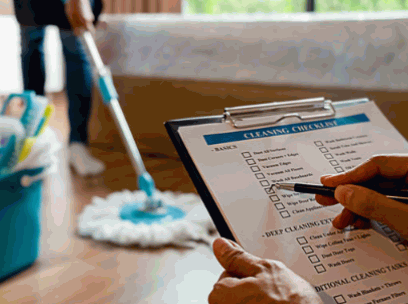
It's a good idea to do a deep clean of your property at this point. It may seem a little early, but by doing a deep clean now, you will make the packing process easier. It also means that come moving day, you will only need to do a refresh. This will save you time, and energy, and, if you decide to hire a cleaner, it'll even help you save money!
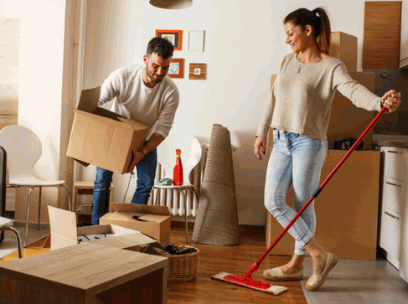
If you're working, you should make sure you request time off with ample notice. This will help to guarantee that your place of work can allow for your absence on the moving day.
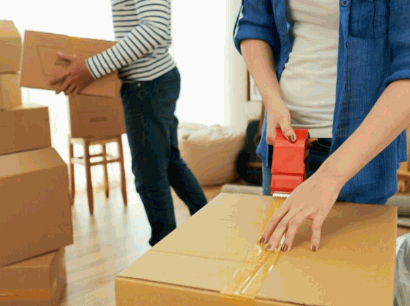
It's time to start getting the bits you need to pack your house! You will need:
You can buy all of these online, but you may find that you can get all your boxes from friends and family members or stores. It's worth asking, as free boxes will help you to save money!
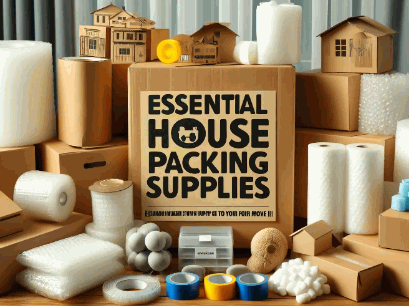
This week is also when you should look into and hire a storage unit if you need one (for example if there is a gap between when you leave your current home and move into your new house). Contact local storage unit companies and gather a few quotes before you pick one.
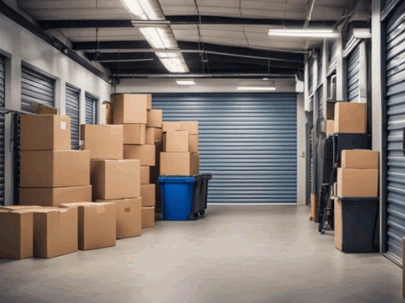
Over the time you've lived in your home, you've probably knocked, dented, and broken a few things here and there - everyone does it! This stage of the moving process is a great time to fix all of these things. Paint over any blu-tac marks, fix the crack in the tile, regrout the bathtub, etc. This will help guarantee you get your security deposit back.
With about five weeks left, it's time for you to decide how you're going to move. If you want to do it alone, and you've got a vehicle that will take all your stuff from A to B, then you're fine. Otherwise, you have to pick between rental truck companies and professional movers. Each has benefits, but for minimal stress, a team of professionals like the experts at Bear Couriers & Removals is always the best call. They can load your moving boxes onto the van and back out again, and all you have to do is get yourself from one location to the other.
You should call your moving company to book your date and secure a quote as soon as you have decided to use one.

Just to be safe, it is always worth getting moving insurance through a decent and trustworthy insurance company. This will protect you and your belongings in the moving process.

Time to go back to your moving folder. If you have any outstanding to-do tasks on your list, now is the time to get through them. Your moving checklist should be pretty much done by this point, giving you the space to get on with packing soon.
This is especially important if you're moving yourself. Make sure your car is happy and ready to roll so that you don't stumble across any awkward surprises on a moving day.
Sometimes when you move GP surgeries, there is a bit of a wait before you can see a doctor to go over your current prescriptions. To make sure you don't end up going without, make sure you've got plenty of your medication before you move.
The time has come to start packing! Use our top ten packing tips below to help you secure your moving boxes and get everything packed neatly and easily. Make sure that, when packing, you label boxes and keep important documents and medical records in one box.
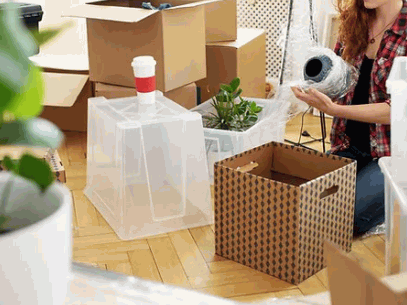
While you shouldn't be packing your kitchen until the week before you move, you should have a list of easy-to-make final meals for the week or so leading up to the move. This will make life much less stressful!
We love our kids and furry friends, but they aren't a great help when it comes to moving home. It's advisable to have friends and family look after them if possible, or to find a sitter for your moving day.
It's important that you don't move any gone off food. To prevent that, you should eat or remove perishables from your kitchen in the weeks leading up to the move.
Now that your moving date is approaching, you should have spent the last month packing, leaving out what you need. It is time to pack essential items and disassemble big furniture items, clean empty rooms and pack suitcases to live out of for the next two weeks. One way to make the move easier is to pack a moving box with snacks, phone chargers, meds, toilet paper, and anything else you might need in the first twenty-four hours.
Take a look: Moving Oversized Furniture
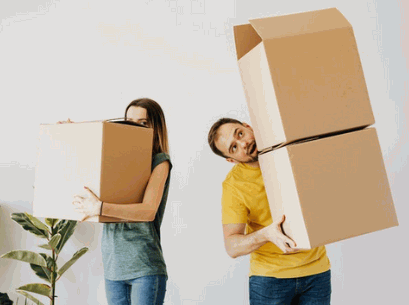
You should arrange a time to pick up the house keys to your new house as well as a time to drop off the keys to your old home. As you finish packing, make sure to take photos of your empty home (especially if renting) to help you if there are any issues regarding your security deposit.
Now that it's almost moving day, you can set up a forwarding address to make sure that you don't miss any posts. This ensures all post is sent to the new address rather than your old one, making life that little bit easier!
Your freezer, to be moved, must have been defrosted. You can unplug it and leave it in the garden (only during good weather) or surround it with towels and rags to absorb the moisture as it melts.
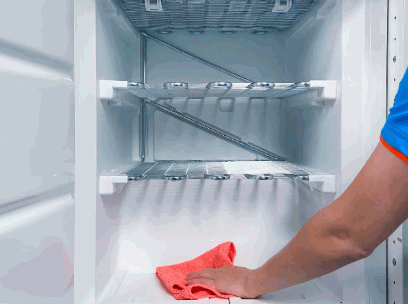
When you're packing rooms like the kitchen, you should try your best to stack fragile items with layers of protection (bubble wrap, fabric, tissue) in between. This limits space in the box, therefore limiting movement and protecting the item.
Explore further: How To Pack Fragile Items
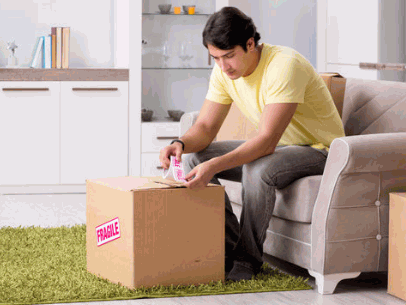
Every box that you use should be labelled comprehensively. It should have a room and a rough description of what is in it written on the top. It should also specify if the box is fragile or not to allow your moving company to best take care of your items.
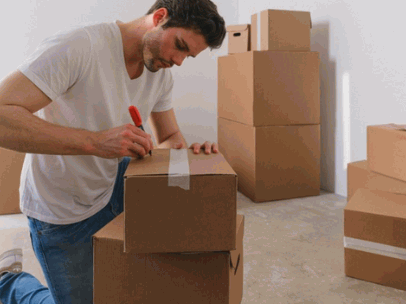
When packing boxes, the heavy items should always be placed in first. This saves the lighter, more fragile items from being broken. It will also make the boxes easier to stack.
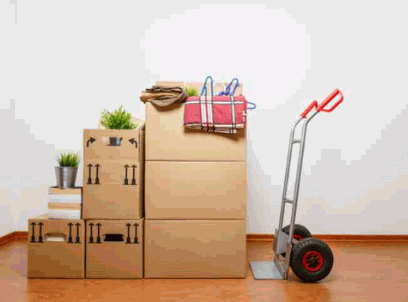
Packing clothes is tedious and if you're not careful, your wardrobe can take up more boxes than you'd expect. The best way to avoid this is to use clothing bags (bonus points for vacuumable ones that shrink!) or to use wardrobe boxes. These allow you to take your clothes straight from the wardrobe into the box and out again.
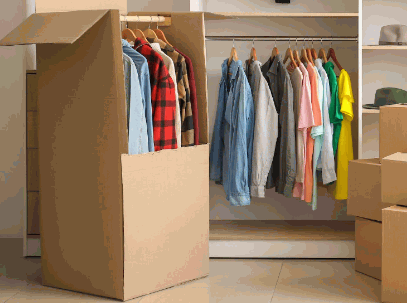
When it comes to packing electricals, especially televisions and game consoles, one of the best ways to pack them is simply to use the original boxes. The boxes that these items come in are designed to keep them safe when they're being shipped around, so if you still have them, load them up!
Alternatively, wrap electricals in blankets and protective gear to keep them safe.
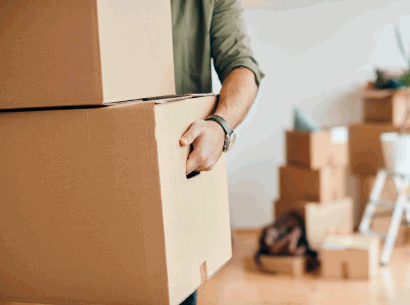
The back of the TV, the back of the PlayStation, and the PC, all have cables that need to be placed carefully for the item to work. If you're not tech-savvy, the best way to ensure you can get your tech up and running in your new house is to take pictures of all the plug arrangements.
Future you will thank you if similar items are packed together when it comes to unpacking. It makes putting items into their new places significantly easier, taking away some of the stress of unpacking.
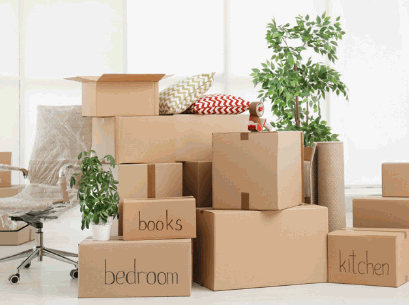
Lightbulbs are incredibly fragile items and are likely to get broken when you move house. Removing a broken lightbulb is quite difficult and very dangerous, so it is always safer to just remove the bulbs before you move and replace them at the other end.
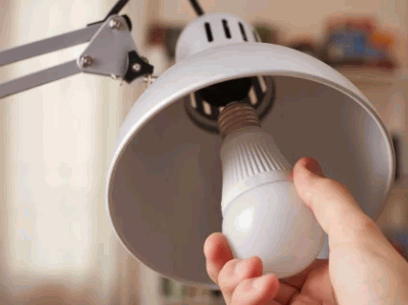
For big items like your mattress or if you run out of packing materials, towels, and blankets make great protective gear for fragile and precious items. Simply wrap them around and tape them shut (and label them), and you've got free padding!
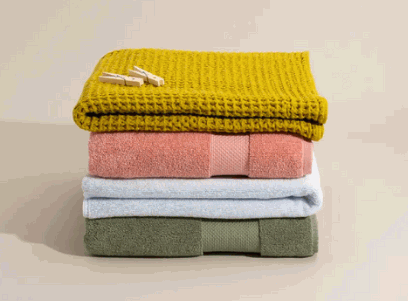
Things like heirlooms, precious jewellery, or urns are very sentimental and can be quite expensive, too. It's worth considering keeping these items with you rather than in the moving van, as that way, you can keep an eye on them.
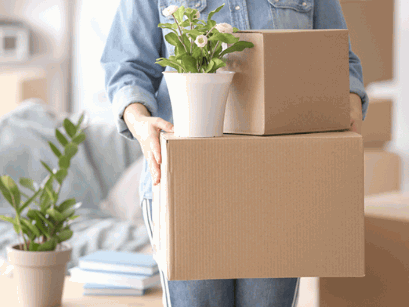
You should start your packing process in the least used room. This means the spare room or the room that's used for storage. Then start on your home's storage spaces. After that, tackle your most difficult room. Doing it early ensures you have the energy to handle it with as much care as it requires.
After that, pack anything that is out of season or unlikely to be used between now and the move such as board games, Christmas decorations, and garden furniture. Then move on to your decor and books, followed by shoes and jewellery, towels, and linens. Do your bedrooms a week or so before you move, and the kitchen just after that, leaving out only the essentials that can be packed in the final week.
Ultimately, how you pack your home is very personal. If you use your bedroom often, but your lounge and dining room are mostly for show, then it'll be different from those who predominantly use their room to sleep in. You should go from least to most used, and try to space it out so that you aren't overwhelmed.
Dig deeper: Moving House How To Pack
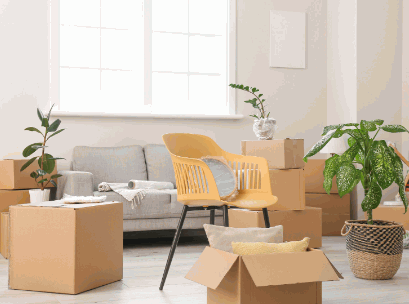
So, the day is here. What now?
Here are the main jobs you will likely need to do on the day you move. If you've hired movers, you should make sure that these are done before they arrive so that there is no delay in loading up the moving van on a moving day.
You will have needed to eat the night before and that morning, which might mean you have food in the fridge or out on the counters. This needs to either be packed away or thrown away so that it's not in the way.

Your fridge that has been keeping your ready meals or whatever is cold for the last couple of days needs to be unplugged now so that you can move it to the new address.
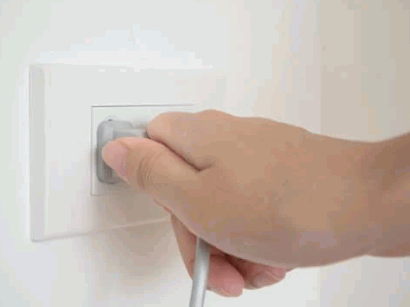
Check with your storage company and moving companies whether they take cash or cards, and, if needed, go and take some cash out in preparation. Even if the companies do take cards, it is sometimes worth having cash on hand in case you need to send someone to a store or something unexpected comes up!
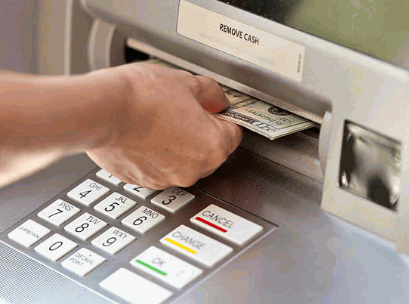
Once you're settled, you can go online and redirect or cancel any packages that didn't make it to your old home in time. They can now be delivered to your new house, instead!
Returning to your old home for one last time, you should go around and do a final clean and walkthrough. This involves checking every nook and cranny for any items you might have left behind and making sure the place is in the same condition as when you moved in. It's worth taking photos during this walkthrough in case you need to argue anything when it comes to your security deposit.

Now you're home, you might want to run around your new place and do a little clean. For renters, this isn't usually necessary, but buyers might find that their sellers didn't leave the place in the best condition!
It's usually at least worth a dust and a hoover before you start building furniture and unpacking your boxes.
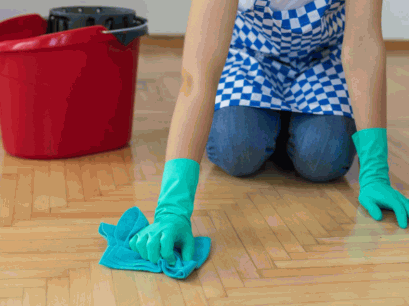
On your first night, there's no need to stress about unpacking everything. Start with the essentials and see how you get on. This means unpacking things like toilet paper and toiletries, bedding, and towels, and building your bed. Then the kitchen and the TV, and from there, see what you have the energy left for!
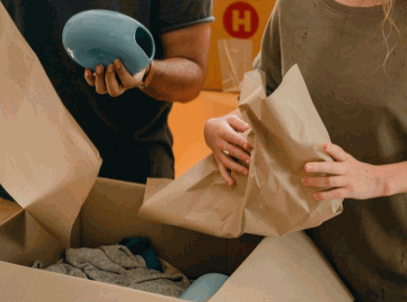
Unless you were able to unpack all your kitchen cupboards and had enough in them to make meals, you might want to pop to your local supermarket or shop to stock up on essentials. Milk, bread, teabags - just the stuff to get you through the night and into your first full day in your new home.
Before you go to bed, it's worth putting up any curtains if they aren't already there. This just gives you some privacy when you're sleeping and wandering around in the morning, and makes the place feel that bit more like home.

Before you go to bed on your first night in your new home, you should always check your fire, smoke, and carbon monoxide detectors. These are essentials, and if they don't work you should replace them as soon as possible, preferably that day.
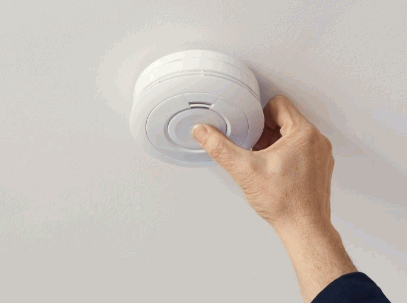




Ready to move? Contact us now and get a free, no-obligation quote. Our team is ready to assist you with all your moving needs.